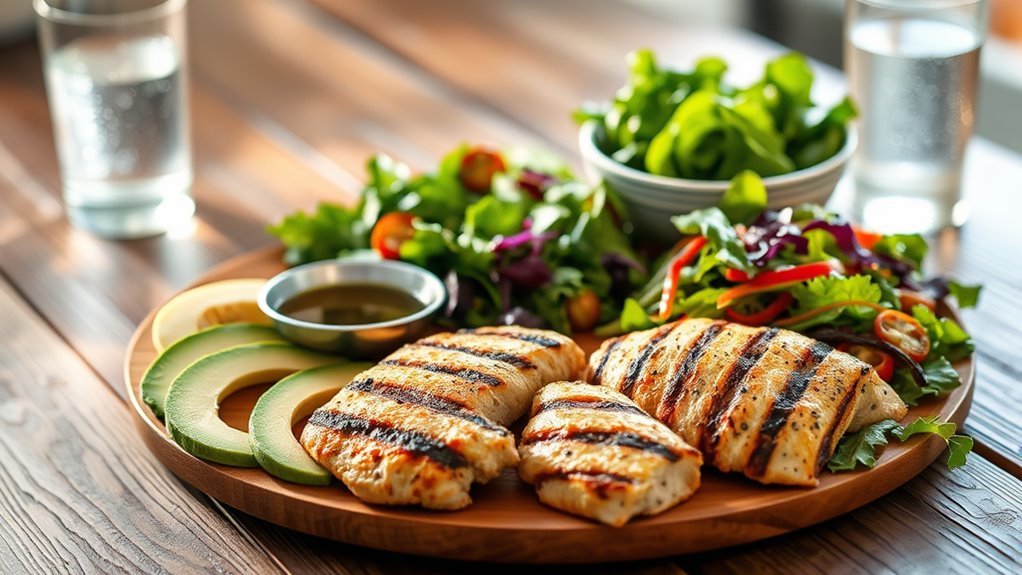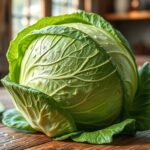Yes, you can do the keto diet without a gallbladder, but it requires some careful adjustments. Since your body produces less bile, fat digestion can be challenging. Try consuming smaller portions of healthy fats throughout the day and focus on easily digestible options like avocados and olive oil. You might consider digestive enzyme supplements to support fat breakdown. Monitoring your symptoms will help you make necessary tweaks to your meal plan for best results. More insights on managing this can help you further.
Understanding the Role of the Gallbladder in Fat Digestion
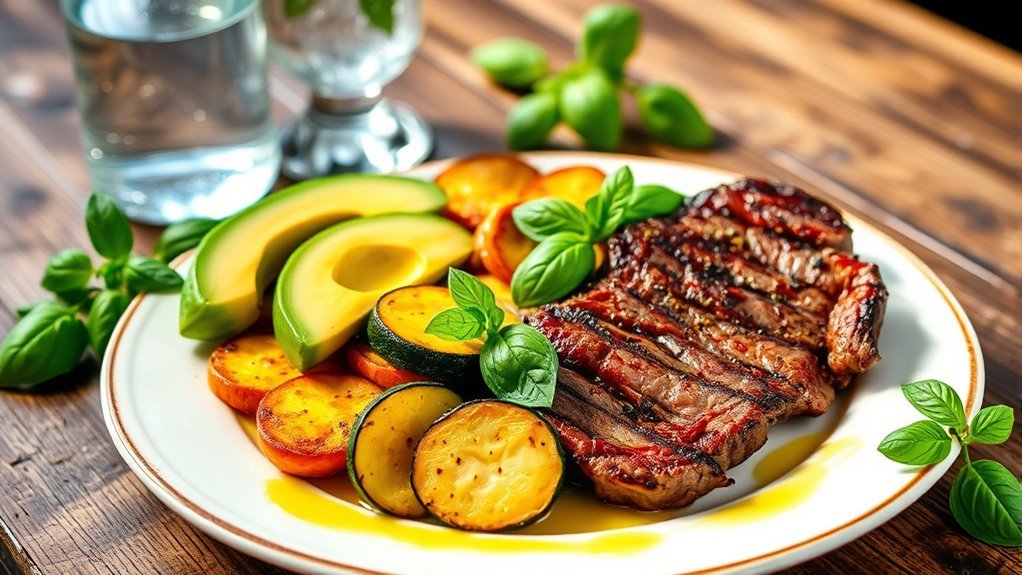
While you may not think much about your gallbladder, it plays an essential role in digesting fats. Its main function is to store and concentrate bile, which helps in fat emulsification. When you eat, your gallbladder releases bile into the small intestine, breaking down fats into smaller, absorbable molecules. This process is important, especially on a keto diet where fat intake is high. Without a gallbladder, your body may struggle to emulsify fats effectively, potentially leading to digestive discomfort. However, many people adapt by eating smaller, more frequent meals, allowing your body to manage fat digestion better. Understanding your gallbladder’s function can empower you to make informed dietary choices, giving you the freedom to enjoy your keto journey. Limiting carbohydrate intake is also crucial for achieving and maintaining ketosis, making it essential to balance fat and carb consumption.
Potential Challenges of the Keto Diet Post-Gallbladder Removal
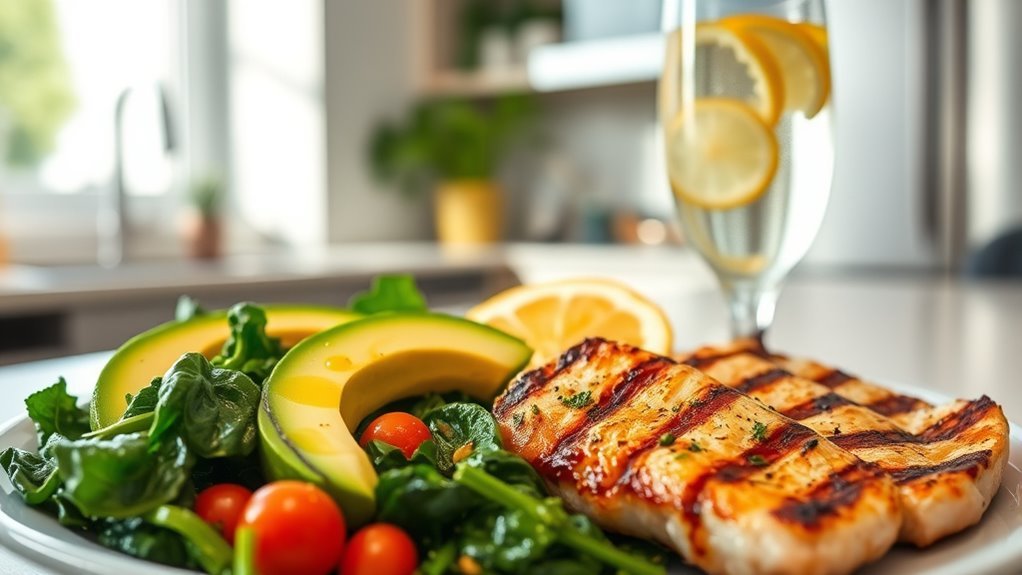
If you’ve had your gallbladder removed, you might face unique challenges when adopting a keto diet. Without this organ, your body’s bile production and regulation of digestive enzymes can be affected, making fat digestion more difficult. You may experience symptoms like bloating or diarrhea, especially with high-fat meals.
Here’s a quick overview of common challenges:
| Challenge | Description |
|---|---|
| Bile Production | Less bile can lead to fat malabsorption. |
| Digestive Enzymes | You might have fewer enzymes for fat breakdown. |
| Fat Tolerance | High-fat meals may cause discomfort. |
| Nutrient Absorption | Reduced absorption of fat-soluble vitamins. |
| Adjusting to Changes | Finding the right balance takes time. |
Navigating these challenges is key to enjoying the freedom of a keto lifestyle.
Adjusting Your Fat Intake for a Keto Diet Without a Gallbladder
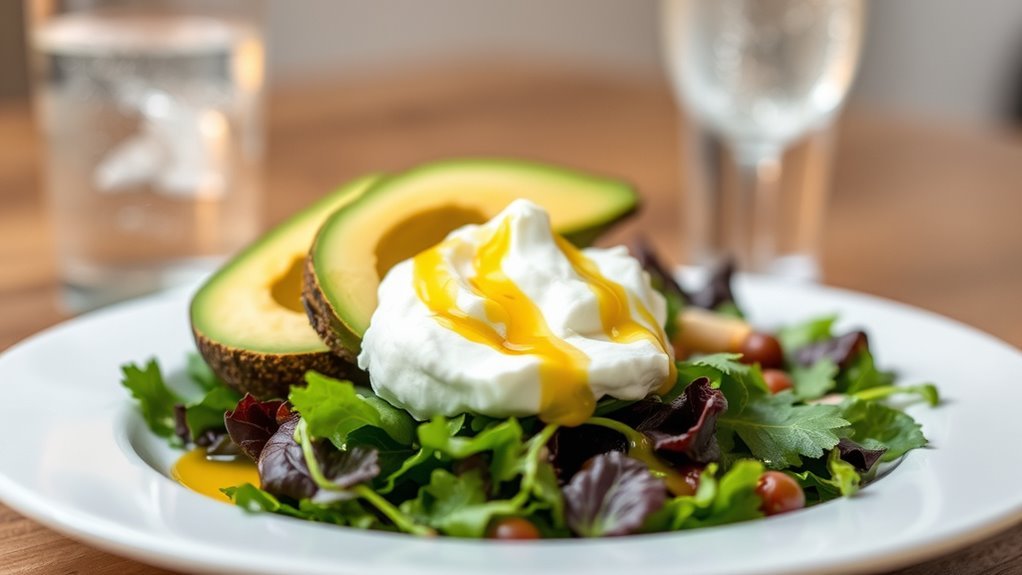
Adjusting your fat intake is important when following a keto diet without a gallbladder. Without this organ, your body may struggle with fat absorption, which can lead to digestive discomfort. To optimize your fat intake, consider incorporating smaller portions of healthy fats throughout the day. This approach helps your body gradually adapt and improves the efficiency of your digestive enzymes. Focus on high-quality fats, like avocados, nuts, and olive oil, which are easier to digest. Additionally, you might benefit from digestive enzyme supplements that support fat breakdown. Remember, it’s all about finding the right balance that works for your body, allowing you the freedom to enjoy a keto lifestyle while feeling your best. It’s crucial to monitor electrolyte levels, as low sodium or potassium can impact your overall well-being.
Recommended Foods and Meal Ideas for Gallbladder-Free Keto
When you’re managing a keto diet without a gallbladder, choosing the right foods is essential to maintain your health and energy levels. Focus on high-quality fats like avocados, olive oil, and grass-fed butter, which are easier to digest. For protein, lean meats, fish, and eggs are great options. Incorporate low-carb veggies such as spinach, zucchini, and broccoli for nutrients without overloading on carbs.
For keto snacks, consider nuts, cheese, or hard-boiled eggs to keep you fueled throughout the day. Meal prep can be a game-changer; batch-cook dishes like cauliflower rice stir-fry or zucchini noodles with pesto. This way, you’ll always have satisfying, gallbladder-friendly meals ready to grab. Additionally, including healthy fats in your diet can support overall health and energy levels while adhering to keto principles. Enjoy the freedom of tasty, nourishing choices!
Monitoring Your Health and Adjusting Your Diet on Keto
As you begin your keto journey without a gallbladder, it’s crucial to regularly monitor your health and make dietary adjustments as needed. Start by tracking symptoms like digestive discomfort or fatigue, as these can indicate how well your body is adapting to the diet. Since your gallbladder isn’t there to store bile, you might need to adjust your macros—consider increasing healthy fats slowly to see what works best for you. Keep a food diary to pinpoint any reactions to specific foods, helping you tailor your meals for ideal well-being. Remember, everyone’s body is different, so be flexible and willing to modify your approach as you learn what truly empowers your health on this adventure. Additionally, understanding insulin sensitivity can be beneficial in managing your blood sugar levels effectively on a keto diet.
Frequently Asked Questions
Can I Experience More Digestive Issues on Keto Without a Gallbladder?
Yes, you can experience more digestive issues on keto without a gallbladder. Since your body might struggle to break down fats, it’s essential to contemplate dietary adjustments. You might need to incorporate digestive enzymes to help your body process high-fat meals more effectively. Start with smaller portions of fats and gradually increase them, allowing your digestive system to adapt. This way, you can enjoy the freedom of keto while minimizing discomfort.
Is It Safe to Take Bile Salts on a Keto Diet?
Yes, it’s generally safe to take bile salts on a keto diet. Bile salts can offer digestive support, especially if you’re experiencing issues after gallbladder removal. They help with fat digestion, which is essential on a high-fat diet like keto. The benefits include improved nutrient absorption and reduced bloating. Just make sure to consult with a healthcare professional to determine the right dosage for your individual needs, ensuring you maintain your freedom in dietary choices.
How Long Does It Take to Adapt to Keto After Gallbladder Removal?
You might take anywhere from a few days to several weeks to adapt to keto after gallbladder removal. The keto adaptation timeline varies by individual, but focusing on healthy fats can ease the shift. To support your recovery, consider incorporating bile salts and eating smaller, more frequent meals. Staying hydrated and gradually increasing fat intake can help too. Listen to your body and adjust as needed for a smoother experience on your keto journey.
Are There Specific Supplements Recommended for Gallbladder-Free Keto?
If you’re starting a gallbladder-free keto journey, consider adding digestive enzymes to your routine. They can help break down fats, easing your change. You might also want to explore bile production support, like ox bile supplements, which can assist in fat digestion. Tailoring your approach with these additions can help you feel more at ease while enjoying the freedom of a keto lifestyle, allowing your body to adapt more smoothly.
Can I Still Lose Weight on Keto Without a Gallbladder?
Yes, you can still achieve keto weight loss after gallbladder removal. While your body might take a little time to adjust, focusing on easily digestible fats, like avocados and olive oil, can help. It’s essential to listen to your body and consider digestive enzyme supplements if needed. Staying mindful of portion sizes and incorporating plenty of low-carb vegetables will support your weight loss journey. Freedom to enjoy keto is still very much within your reach!
Frequently Asked Questions
1. Can you follow the keto diet without a gallbladder?
Yes, you can follow the keto diet without a gallbladder. The key to success lies in understanding how your body processes fats. After gallbladder removal, your liver still produces bile, but it may be released in smaller amounts, making the digestion of high-fat foods a bit more challenging. Starting gradually with fats and choosing easily digestible sources can help your body adapt.
2. What are the best fats to include in a gallbladder-free keto diet?
Opt for healthy fats that are easier to digest, such as avocados, olive oil, coconut oil, and nut butters. These fats provide essential nutrients and can be gentler on the digestive system. Additionally, consider incorporating low-fat dairy options or fatty fish like salmon, which are rich in omega-3 fatty acids and beneficial for overall health.
3. Are there any specific challenges of doing keto without a gallbladder?
Yes, individuals without a gallbladder may experience difficulties in digesting larger amounts of fat, leading to symptoms like diarrhea or bloating. To mitigate these issues, it’s advisable to start with moderate fat intake and gradually increase it as your body adjusts. Eating smaller, more frequent meals can also help improve digestion.
4. Should I take any supplements while on a keto diet without a gallbladder?
Consider consulting with a healthcare provider about taking digestive enzymes or bile salts to aid in fat digestion. Additionally, a multivitamin may be beneficial to ensure you’re meeting all your nutritional needs while on a restrictive diet like keto. Individual needs can vary, so professional guidance is essential.
5. How can I ensure I’m getting enough nutrients on a keto diet without a gallbladder?
To ensure you’re getting enough nutrients, focus on a variety of low-carb vegetables, healthy fats, and protein sources. Incorporate foods like leafy greens, cruciferous vegetables, nuts, seeds, and lean meats. Planning balanced meals and potentially working with a nutritionist can help you maintain a well-rounded diet while on keto.
References
- https://www.ncbi.nlm.nih.gov/pmc/articles/PMC6472261/
- https://www.health.harvard.edu/staying-healthy/the-ketogenic-diet
- https://www.mayoclinic.org/healthy-lifestyle/nutrition-and-healthy-eating/expert-answers/keto-diet/faq-20458251
- https://www.webmd.com/diet/what-is-the-keto-diet
- https://www.clevelandclinic.org/health/diseases/21697-gallbladder-disease
- https://www.ncbi.nlm.nih.gov/pmc/articles/PMC6520680/
- https://www.eatright.org/health/wellness/preventing-illness/the-ketogenic-diet
- https://www.healthline.com/nutrition/keto-diet-without-gallbladder
